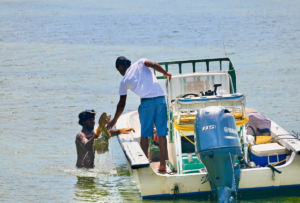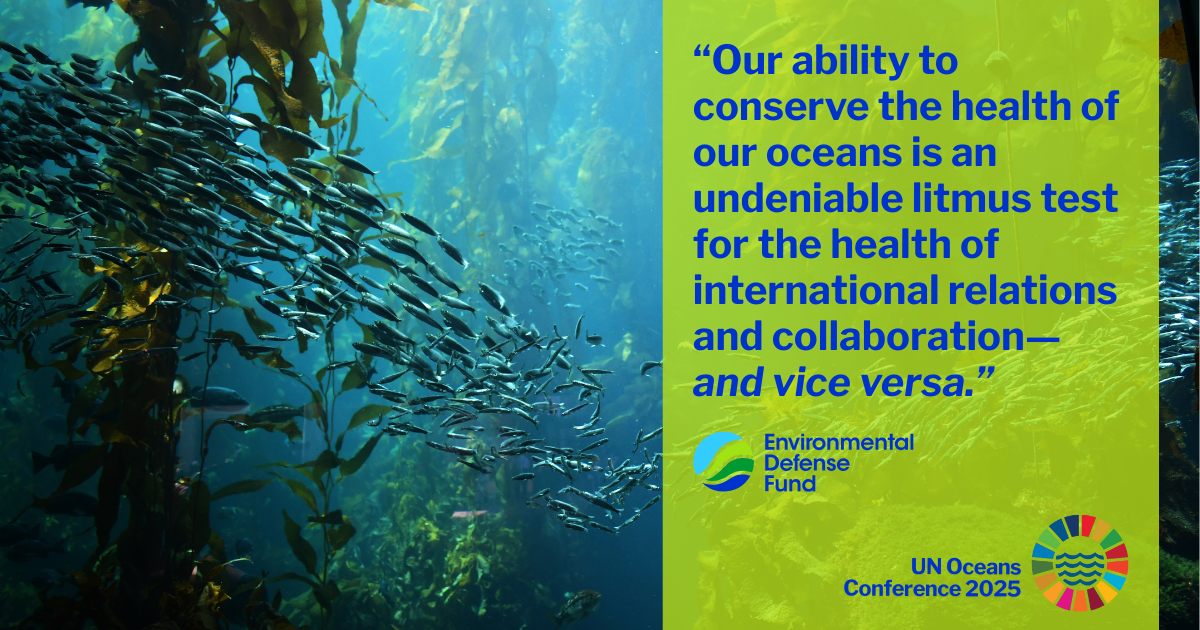
How Fishers Are Protecting Their Communities from Hurricanes
By: Aubrey Taylor
Tropical Storm Oscar crept up from the North Atlantic Ocean at a leisurely 40 miles per hour on the morning of Oct. 19, 2024 and ambled toward the Turks and Caicos Islands. Based on the data available, meteorologists believed the tiny storm was unlikely to cause major damage. Yet only three hours later, Oscar’s wind speeds had somehow doubled to a destructive 80 miles per hour—and the tropical storm was now, undeniably, a Category 1 Hurricane.
Disaster in Cuba
Hurricane warnings were issued in The Bahamas and across Cuba on that afternoon. But just one day earlier, Cuba’s power grid failed and plunged the nation into a blackout. Without internet or electricity, there was no way to dispatch warnings to all of the 11 million Cubans scattered across the island.
Hurricane Oscar hit the coast of Cuba on the evening of Oct. 20. Waves breached the seawall and flooded Baracoa, Imías, and Maisí. Thousands of homes were destroyed in eastern Guantánamo. Flooding, wind, and landslides descended upon power lines, crop fields, salt flats, and storage facilities for Cuba’s major exports. The hurricane killed at least eight people.
It wasn’t over yet. By Oct. 21, Oscar had veered back toward The Bahamas.
The Importance of Data
Luckily, Oscar’s winds died back down to 40 miles per hour by the evening of Oct. 21. Residents of the Southern Bahamas sheltered as Oscar passed, bringing minimal damage. But what if, instead of 13, there were thousands of fishing vessels in the North Atlantic Ocean and Caribbean Sea collecting data during every hurricane season? What if Hurricane Oscar had been forecasted one week in advance, instead of one day?
The problem is that ocean data is expensive and incomplete. Currently it’s only collected in the deep seas—far from hurricane impact zones—or by satellites, which failed to accurately monitor Hurricane Oscar due to its small size. Meteorologists need more ocean data, fast.
The Fishing Vessel Ocean Observing Network (FVON) sees the solution in the two million fishing vessels floating over the world’s coasts. By attaching sensors to fishing gear, ocean data can be continuously collected in hurricane-prone regions to improve forecasts and save lives. Not only is this method cost-effective, but it also empowers communities to ensure the data benefits their day-to-day lives.
Just two months before Oscar hit, FVON was hard at work on-site in The Bahamas. FVON’s partners at Environmental Defense Fund and Ocean Data Network met with local fishers to discuss how ocean data could serve the needs of coastal communities: by supporting the livelihoods of fishers, ensuring food security for their families and neighbors, and—of course—preparing for increasingly unpredictable hurricanes in the face of climate change.
FVON’s new network in The Bahamas is already an early success story. For the past two months, fishers operating 13 vessels across seven islands have been collecting ocean data and delivering it directly to the National Hurricane Center (NHC) and the Atlantic Oceanographic and Meteorological Laboratory (AOML). The data is essential for predicting hurricanes like Oscar.
The Vision
FVON began in 2022, and it’s already been endorsed by the United Nations as an action of the Decade of Ocean Science and as an emerging Global Ocean Observing System network. Fishers, national governments, and meteorological organizations continue to recognize FVON’s potential to completely alter the paradigm of ocean data collection.
Because FVON utilizes existing vessels for its sensors, it can generate low-cost ocean data at an unprecedented pace, in shallow waters which have historically lacked observation. And as FVON continues to mature as an organization, it has begun to seek new funding mechanisms through private industries, allowing sensors to be deployed faster than ever when time is of the utmost importance.
By 2030, FVON envisions that tens of thousands of fishing vessels will be equipped with sensors and leading the ocean data collection effort across the globe, with marked improvements in hurricane forecasts to show for it.
Keep an eye out for FVON updates by visiting its website or following @FVoceanON on X (formerly Twitter), and consider donating to the following organizations to support recovery efforts in Cuba:












